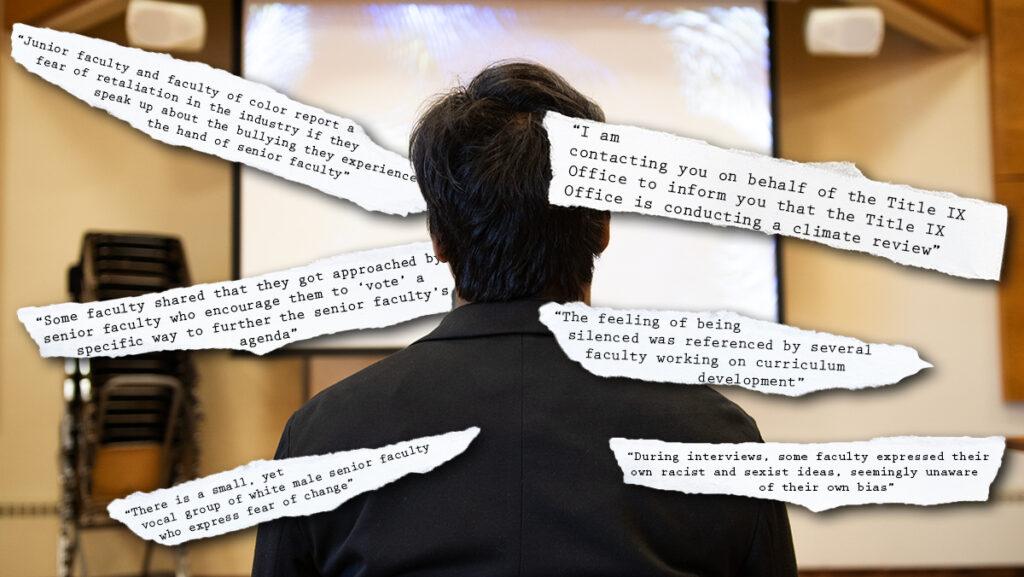As a first step in preventing discriminatory behavior at Ithaca College, a cultural review of the then-School of Music was conducted in summer 2021 that identified three main sources of tension among faculty and staff: tenure, the school’s environment, and race and gender.
The cultural review in the former School of Music — now the Center for Music in the School of Music, Theatre and Dance — was conducted by Title IX Coordinator Linda Koenig; Omar Stoute, former deputy Title IX coordinator; and Keith Kaiser, former dean of the School of Music for the 2020–21 academic year and current professor in the Department of Music Education. The facilitators of the review met privately with 21 faculty and staff in the School of Music and asked them a series of questions about the culture of the music industry and the School of Music; experiences and comfort in the School of Music; relationships and group dynamics; discrimination and bullying; opportunities and professional growth; and representation.
[slideshow_deploy id=’46899′]
Some faculty were concerned with the lack of communication surrounding the cultural review. Diane Birr, professor in the Department of Music Performance, said she had no knowledge that a cultural review was being conducted until she was emailed July 26, 2021, and asked to participate. Birr said she was told by Koenig that 10 to 15 people were suggested to reach out to — Birr said she does not know who made the suggestions — and that some people who were interviewed suggested other people to contact.
“The cultural review was imagined because we were looking to identify ways to do prevention work that was really intentional,” Koenig said. “The best way to do that is to learn about the culture of the group of people you want to deliver that work to.”
Both the review process and the release of the summary elicited mixed reviews from faculty and administration, as expressed at Faculty Council meetings and through conversations with The Ithacan. Some concerns included protecting the privacy of the individuals who shared their perspectives in the review, the lack of transparency from administration to faculty regarding the process, the timeliness of releasing the summary and the room for bias in the review process.
Other faculty told The Ithacan that regardless of the potential flaws in the process of conducting the review, there is valuable information that can be used from the summary of the review to take actionable steps toward creating a more inclusive environment.
The summary was shared Feb. 1, 2023, with music faculty and staff, and participants remained unnamed. In the summary, faculty and staff without tenure expressed feeling silenced by senior faculty.
Participants said that in the building’s common areas, they felt fearful of confrontations with senior faculty and reported fearing retaliation if they spoke up about being bullied. Participants also said they faced challenges while enacting curricular changes because of the dominance of white, male faculty in the school and the music industry.
Faculty and staff reported that conversations addressing sexism and racism create tension and fear, and a small, but vocal, group of white, male, senior faculty expressed fear of change. The summary said faculty and staff of color described feeling like outsiders and considered leaving higher education as a result. The summary also noted that some participants expressed their own racist and sexist views.
The executive summary was created by Koenig and Ivy Walz, former dean of the School of Music for the 2021–22 academic year and current associate dean of the School of MTD, on Feb. 8, 2022. A year later, Feb. 1, themes from the review were presented by Koenig and Walz at a Center for Music faculty meeting and the written summary was shared. At the Feb. 7 Faculty Council meeting, the cultural review was presented and discussed among faculty leadership.
Baruch Whitehead, associate professor in the Department of Music Education and head of the Anti-Racism Committee in the School of Music, Theatre, and Dance, said he was one of the faculty members interviewed. Whitehead said one issue he found with the review was the lack of specific information about what led to the identification of the three themes.
“I just thought the report should be distributed with the data … and not just give us the themes,” Whitehead said. “[How] people really feel, I felt like that was important for the whole community to hear. … Overall, I think the community really wants to do the right thing, but how we get to the right thing is the process that we have to go through.”
Whitehead said part of what makes the work difficult is protecting the privacy of confidential interviewees while also being specific about what the issues are. Koenig confirmed specifics were purposefully left out of the summary to protect the privacy of participants.
“There weren’t any names attached to the statement, but as the only tenured Black man in the school at the time, if I say something, you don’t have to be a scientist to figure out who said it,” Whitehead said.
In Fall 2022, the Office of Analytics and Institutional Research reported 15.4% of faculty, administration and staff identified as Black, Indigenous and people of color.
A non-white faculty member in the Center for Music, who wished to remain anonymous out of fear of retaliation, was concerned with the delay in sharing the summary. The interviews with faculty and staff were conducted in summer 2021, but the results were not presented to all music faculty until Feb. 1, 2023.
“There’s a lack of transparency,” the faculty member said. “If there’s discrimination, there’s cases of racism in the School of Music; those need to be addressed, but they need to be addressed in a timely manner. We don’t need to wait two years for a report to come up.”
Whitehead also said he wanted the summary to be shared in August 2022 because of annual pre-semester faculty retreats that would provide the opportunity to discuss the summary.
Renee Madison, acting Title IX coordinator and vice president for equity and inclusion at Colgate University, said Colgate administered its first faculty and staff Higher Education Data Sharing climate survey in Spring 2021 to assess climate among faculty and staff. Madison said information on bias and culture was part of that survey, which will be conducted by the university every three years.
“We sent a report to campus about the overall executive summary of the survey results. We provided access to the survey results to faculty, staff and students,” Madison said. “Ahead of providing institution-wide access or community-wide access, we made sure to share the survey results with the relevant committees that work with and are concerned about campus climate.”
In addition to an executive summary, Colgate shared a gap analysis with the campus community to show the largest differences among self-identified communities. The survey was done anonymously online, and the only place where individuals could be identified was in the open-ended portions, which were vetted before being released.
“Anonymous surveys and interviews and firsthand accounts, as well as other data points, can be really helpful to be able to assess general themes about climate,” Madison said.
Claire Borch, director of Ithaca College’s Office of AIR, said via email that AIR has not been a member of HEDS since the 2009–10 academic year. AIR has not been involved in any campus climate surveys since the last one was administered in 2016.
While the email asking for music faculty to participate in the review said this review would be part of a wider climate review of other schools, the review process halted with the School of Music.
At the Feb. 7 Faculty Council meeting, Melanie Stein, provost and senior vice president of academic affairs, said the college did not continue the review across campus because nobody at the college has the capacity to continue this work.
Koenig said she had a long, positive relationship with the School of Music because faculty and staff invited her to speak in meetings and courses with students.
“I had strong relationships to begin to have transparent and honest conversations,” Koenig said. “It was the first time that we were embarking on something like [the review], so [the School of Music] was a good place to start.”
Stein said cultural reviews like the one conducted in the School of Music are not the responsibility of Title IX coordinators but fall under human resources jurisdiction.
“There is a conversation ongoing at the upper levels of the college about how … there were no resources in human resources,” Stein said. “That sounds ridiculous, but the [Office of] Human Resources was a little understaffed and so they didn’t have the capacity to do such a [review].”
In April 2021, there were three executive positions in the Office of Human Resources, one staffer in Employee Relations, Development, and Engagement, and one staffer in Human Resources Information Systems. There were 12 staffers in total, including executive positions. As of Spring 2023 — and position titles have since changed — there are five staffers in Human Resources Operations and 12 in the office overall.
Koenig said one of those resources includes people who would transcribe interviews and identify themes from the interviews. She said her office of two people only has the time to work on a review like this in the summer, but it is hard for faculty to volunteer to participate outside of contracted hours.
At the Feb. 7 Faculty Council meeting, Rachel Schutz, assistant professor in the Department of Music Performance, said that although there may be issues with the process of conducting the review, creating spaces for faculty to speak about their experiences is important for faculty to feel comfortable sharing their perspectives on discrimination and bias.
“It’s not maybe perfectly representative, but I think it was helpful to hear from faculty,” Schutz said at the meeting. “I don’t think it’s the report that’s making certain claims. [The report is] trying to summarize what faculty themselves said.”
Mat Fournier, assistant professor in the Department of World Languages, Literatures, and Cultures, said he sees similarities between findings from the School of Music’s cultural review and his findings from his experience teaching, especially as someone who identifies as transgender.
“I had the experience to teach in two different genders and privileges are real,” Fournier said. “When you walk into a room passing as male, the atmosphere is entirely different than when you walk into [a room] passing as female. … If you pass as a woman, and you feel seen as a woman, you have to talk much louder to be heard … and it’s absolutely impossible to measure.”
Fournier also said there are aspects of racial discrimination that, as a white person, he cannot see because he does not experience them directly. He said that just because he does not experience the pressure of voting or teaching in certain ways, this does not mean that pressure does not exist.
“I think our colleagues need to realize that privileges are very real, and they have a lot more weight than we think on things that cannot even be expressed,” Fournier said.
Whitehead said the issues expressed in the summary are not unique to the School of MTD and are not unique to the college but rather reflect national trends. He said it is important not to dismiss the perspectives that were shared because they are hard to hear.
“The report was just data,” Whitehead said. “It wasn’t something that people made up or came from a movie script or anything like that. It was data, and this is how people felt. … We can become defensive, or we can say, ‘Oh, if I made someone feel that way, I’m really sorry, I need to change my actions.’”
Walz said the review can help open people’s eyes to the systems within the music industry that contribute to the issues described by the interviewed faculty.
“As a musician, it’s a system I was raised in,” Walz said. “I was blinded to these [issues] until I started to learn. It’s up to all of us to continue to learn and listen to each other so that we can understand the system and see the things in place that are not contributing [positively] to the work environment.”
Koenig said people interviewed in the review talked about discrimination and bias issues in the music industry.
“[Interviewees] regularly referenced the fact that [the themes] were no different than the industry and that these conversations were happening at national conferences, as well as within the School of Music.”
According to a 2018 survey conducted by the Music Industry Research Association and the Princeton University Survey Research Center, 72% of female musicians surveyed said they had experienced gender-based discrimination, and 67% reported experiencing sexual harassment. According to the same survey, 63% of non-white musicians reported experiencing race-based discrimination.
The conclusion of the executive summary of the former School of Music’s cultural review offers suggestions for how to proceed. One recommendation is to engage in small-group dialogue about the results of the review after it is shared with faculty and staff. It also suggests the creation of personal improvement plans for faculty who demonstrate bias, bullying and other discriminatory behaviors.
Anne Hogan, dean of the School of MTD since Fall 2022, said she has had ongoing discussions with people in the School of MTD Strategic Planning Group to figure out next steps. Hogan said one option is convening a school-wide committee to help facilitate discussions.
“What kind of projects and initiatives could we implement that will help us to ensure that we have this welcoming and inclusive and equitable environment?” Hogan said.
Whitehead said he suggested that the School of MTD bring in an expert who has dealt with similar issues in other institutions or organizations to unpack the summary in a healthy way.
“Getting this report, it’s a step in the right direction for us to unpack and to make some changes, and not just progress,” Whitehead said. “We need to make change, not progress. Progress is great. Change is better.”










